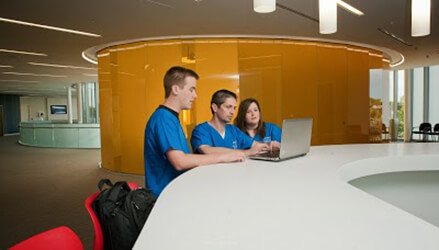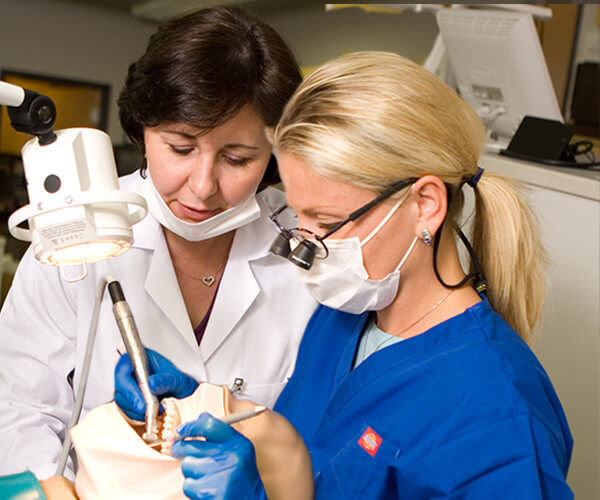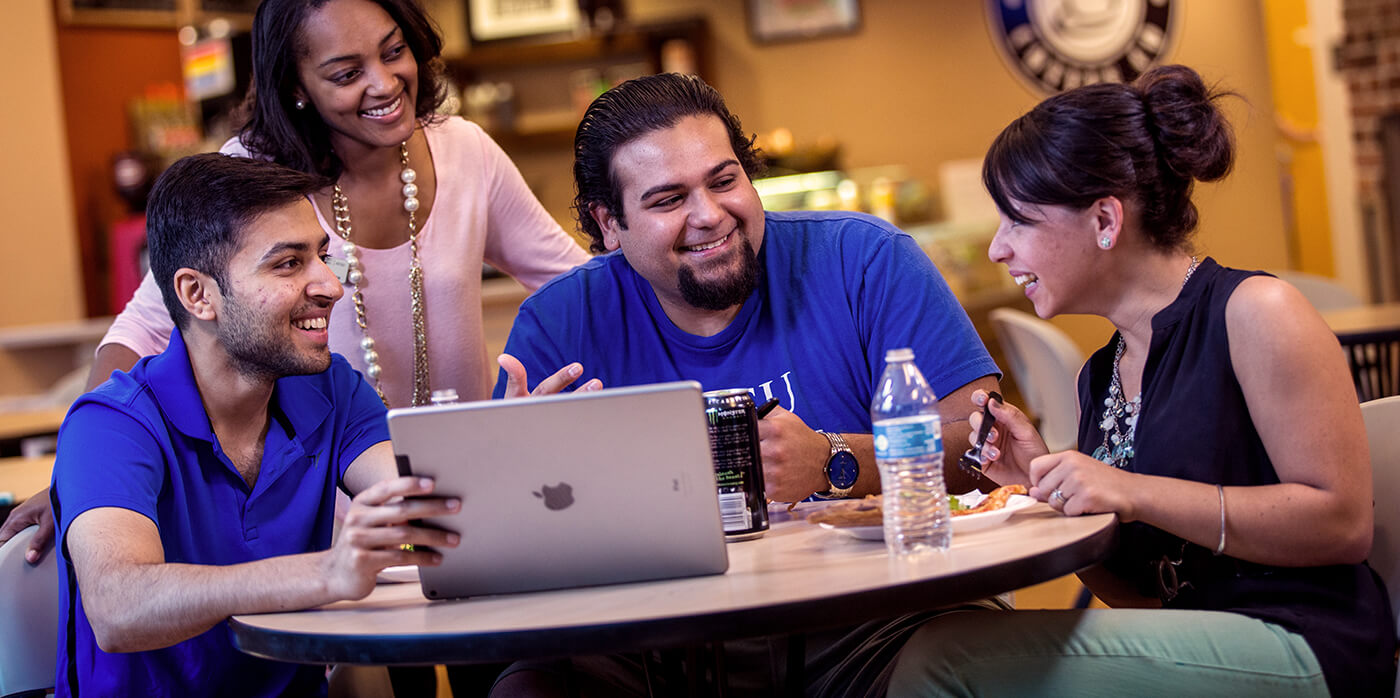Predoctoral program competencies
Professionalism: Practice dentistry guided by professional values, ethical principles, self-assessment and as required by legal principles and regulatory concepts to address the oral health needs of individual patients and the community. CODA 2-10, 2-11, 2-17, 2-21
Scientific Practice: Apply critical thinking, problem-solving, quantitative knowledge and reasoning (including analysis of data, appraisal of evidence, synthesis and integration of new information) to the practice of dentistry. CODA 2-10, 2-11, 2-18, 2-22
Human Sciences: Apply knowledge of molecular, biochemical, cellular and systems-level mechanisms that maintain homeostasis and of the dysregulation of these mechanisms to the prevention, diagnosis and management of disease in the dental patient. CODA 2-10, 2-12, 2-13, 2-14
Behavioral Sciences: Apply behavioral principles to function successfully in a multicultural work environment, to manage and educate a diverse patient population, and to promote, improve and maintain the health of dental patients. CODA 2-16, 2-17, 2-23, 2-24 e,d
Treatment Planning: Formulate a provisional, differential and definitive diagnosis and a comprehensive, sequenced treatment plan, alternative plans and limited care plans for dental patients; make referrals to other providers; describe prognosis; obtain informed consent, evaluate outcomes of treatment, and recommend recall. CODA 2-10, 2-24 a, c, o, 2-25
Patient Care: Assess and manage the oral health care needs of patients within the scope of general dentistry in all stages of life (infants, children, adolescents, adults, geriatric patients and patients with special needs). CODA 2-10, 2-22, 2-23, 2-24 b, c, d, e, f, g, h, i, j, k, l, m, n, o; 2-25, 2-26
Practice Management: Apply principles and philosophies of patient management, models of health care delivery and leadership of an oral health care team. CODA 2-18, 2-19, 2-20
Public Health: Work collaboratively to assess, address and/or solve population-based health issues using the public health principles of assessment, policy development and assurance. CODA 2-10, 2-18, 2-26
Interprofessional Practice: Function effectively, respectfully and ethically in an interprofessional team to plan and deliver patient/population-centered care. CODA 2-19, 2-20, 2-24 c
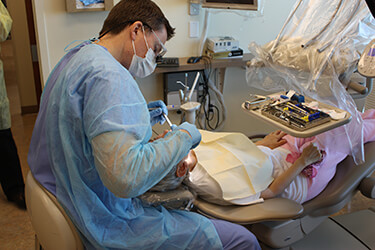
Public health certificate
In addition to the DMD curriculum, all MOSDOH students take the following courses to earn a certificate in public health with a dental emphasis:
- Introduction to Dental Public Health
- Behavioral Sciences and Health Education Concepts
- Epidemiology
- Dental Healthcare Policy and Management
- Financing Dental Care
The first course in the certificate program is taken at the beginning of the second year. Courses are block-based and offered online in 10-week sessions through ATSU’s College of Graduate Health Studies. Students who wish to complete a master’s degree in public health need 10 additional courses of the 15 in the curriculum. These courses, in addition to the dental school curriculum, will provide students with a broad exposure to service- and community-based learning.
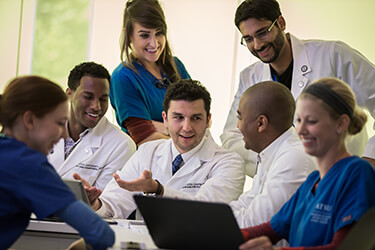
Research program
ATSU-MOSDOH employs a multifaceted approach to engage students in research, comprising research experiences within the curriculum and an Elective Research Module. The school curriculum weaves research engagement across various stages, ensuring students encounter research concepts throughout their education. The first 2 years of the program provide the students with the foundational knowledge and skills required to implement evidence-based dentistry (EBD) in dental practice. The third year involves collaborating with faculty mentors to conduct research and present the findings during MOSDOH Research Day. This comprehensive approach nurtures students' research curiosity, equipping them with the competence to contribute to evidence-based dentistry, fostering lifelong engagement with research, and fortifying their role as informed practitioners in the evolving dental landscape.
On the other hand, the elective Research Module offers early and advanced research experiences for students who are more interested in research through dedicated platform to delve into research methodologies, literature review, and proposal development under the guidance of faculty mentors. This focused initiative allows students to cultivate advanced research skills and support those who are interested in research careers.
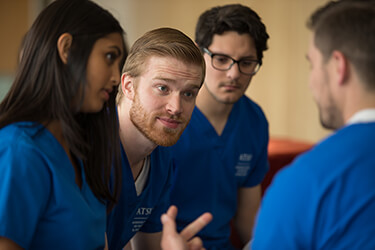
Simulation clinic
The dental simulation clinic at the IPE building, located on the first floor, serves as an advanced learning facility for ATSU-MOSDOH students. Here, they gain proficiency in dental sciences using state-of-the-art technology before transitioning to patient-care settings in St. Louis. The clinic is equipped with various cutting-edge technologies, including CAD-CAM (CEREC) scanning and milling units, a 3D Asiga printer, a 3D E4 lab scanner, a sensor-equipped dental anesthesia training manikin, a dental radiology manikin, and other educational equipment and models.
Spanning over 7,000 square feet, the simulation clinic boasts 68 student workstations. Each workstation is outfitted with a KaVo Mannekin Simulator, LED dental light, dental instruments, and a flat screen display monitor. To facilitate students' practice, each station is equipped with their own Operative dentistry cassette, Composite restoration instrument cassette, Rubber dam cassette, alginate impression, and stone model armamentarium, enabling them to perform various dental procedures during their simulation sessions.
At the front of the clinic, there's an instructor's station that allows faculty members to demonstrate techniques, which can be broadcasted directly to each individual student station. This broadcasting setup involves two computers, a document camera capable of projecting highly magnified images, and a ceiling-mounted camera used for demonstrating faculty-on-manikin procedures. This setup ensures that students can clearly observe faculty/patient positions during the procedures.
Additionally, the simulation clinic has five faculty stations, each equipped with a microscope and a 7-inch screen display with powerful magnification capabilities of up to 1200X. This equipment is utilized to provide feedback and critique to students on their daily projects and work.
Besides student and faculty workstations, the clinic features six dental operatories equipped with digital x-ray units and touch screen computers. The clinic also houses a sterilization center, a dispensary, and a wet lab with eight sinks and stainless steel workspaces to support various dental activities and preparation.
Overall, the dental simulation clinic at the IPE building provides an innovative and comprehensive learning environment for ATSU-MOSDOH students, ensuring they are well-prepared and skilled before they proceed to real patient care in St. Louis.
